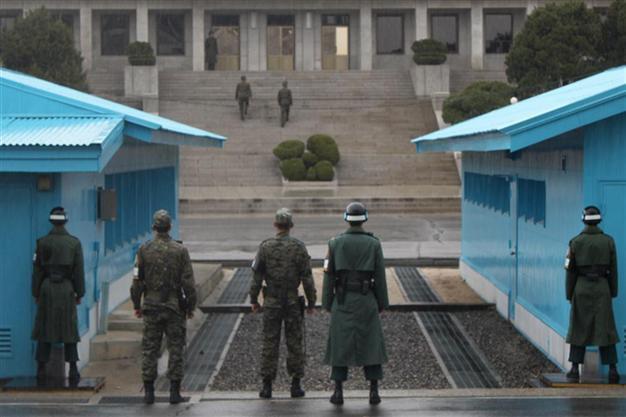South Korea raises alert before expected North Korea missile test
SEOUL - Agence France-Presse

South Korean soldiers stand guard at the tense border truce village of Panmunjom in the demilitarised zone, which splits the Korean peninsula, watching a North Korea building on April 9, 2013. North Korea warned foreigners in South Korea to consider evacuation, a warning that was largely greeted with indifference. AFP PHOTO / RUBY TAM
South Korea raised its military watch alert to "vital threat" Wednesday before an expected North Korean missile launch, as UN chief Ban Ki-moon warned the Korean peninsula may be slipping out of control.
The North last week, told foreign diplomats in Pyongyang they had until April 10 to consider evacuation, fuelling speculation a launch was planned between Wednesday and the April 15 birthday celebrations for late founder Kim Il-Sung.
South Korean intelligence says the North has prepared two mid-range missiles for imminent launch from its east coast, despite warnings from ally China to avoid provocative moves at a time of soaring military tensions.
South Korean Foreign Minister Yun Byung-Se told parliament the launch could take place "anytime from now on" and warned Pyongyang it could trigger a fresh round of UN sanctions.
On Tuesday, the North reiterated a warning that the peninsula was headed for "thermo-nuclear" war and advised foreigners to consider leaving South Korea.
In a further sign of rising nuclear tensions, a key border crossing between North Korea and China has been closed to tourist groups, a Chinese official said Wednesday.
The South Korea-US Combined Forces Command raised its "Watchcon" status from 3 to 2 to reflect indications of a "vital threat", Yonhap news agency said, citing a senior military official.
Watchcon 4 is in effect during normal peacetime, while Watchcon 3 reflects indications of an important threat. Watchcon 1 is used in wartime.
North Korea prepares for 'multiple launches': ClaimIn a separate report, Yonhap quoted a government source as saying Pyongyang might be preparing "multiple" launches, after other launch vehicles were reportedly detected carrying shorter-range SCUD and Rodong missiles.
Although the North's warnings to embassies in Pyongyang and foreigners in the South were both largely shrugged off, there is growing global concern that sky-high tensions might trigger an incident that could swiftly escalate.
North Korea has wielded the "thermo-nuclear war" threat several times in recent months -- most recently on March 7 -- despite expert opinion that it is nowhere near developing such an advanced nuclear device.
The current crisis on the Korean peninsula has been intensifying almost daily since the North's nuclear test in February, which drew toughened UN sanctions.
Incensed by ongoing South Korean-US military exercises, Pyongyang has accused Washington and Seoul of preparing an invasion and threatened dire military actions from artillery barrages to nuclear strikes.
Japan deploys Patriot missilesJapan, where the armed forces have been authorised to shoot down any North Korean missile headed towards its territory, said Tuesday it had deployed Patriot missiles in its capital as a pre-emptive defence measure.
But a top US military commander, Admiral Samuel Locklear, said Tuesday he favoured shooting down a North Korean missile only if it threatened the United States or Washington's allies in the region.
If North Korea pushes ahead with the launch, the UN Security Council will convene immediately, Foreign Minister Yun said.
"It's hard to predict what kind of action the Security Council might take, as the nature of such a launch would have to be analysed first," he said, adding fresh sanctions were a possibility.
Probe says North Korea behind cyber attack: SeoulAn official investigation into a major cyber attack on South Korean banks and broadcasters last month has determined North Korea's military intelligence agency was responsible, officials said Wednesday.
The probe into access records and the malicious codes used in the attack pointed to the North's military Reconnaissance General Bureau as the source, the Korea Internet and Security Agency (KISA) said.
"It was a premeditated, well-planned cyber attack by North Korea", a KISA spokesman said.
"We've collected a lot of evidence to determine the North's Reconnaissance General Bureau led the attack, which had been prepared for at least eight months," he said.
A joint team of civilian and government experts traced the origin to six personal computers used in North Korea.
In order to spread malware in target computers, the hackers went through 49 different places in 10 countries including South Korea, the investigation found. The North had used 22 of the places in past attacks.
The March 20 attack completely shut down the networks of TV broadcasters KBS, MBC and YTN, and halted financial services and crippled operations at three banks -- Shinhan, NongHyup and Jeju. It employed malware that can wipe the contents of a computer's hard disk as well as drives connected to the infected computer.
About 48,700 machines including PCs, automatic teller machines and server computers were damaged, KISA said.
The attack came days after North Korea had accused South Korea and the United States of being behind a "persistent and intensive" hacking assault that temporarily took a number of its official websites offline.
It also coincided with heightened military tensions on the Korean peninsula, following Pyongyang's nuclear test in February.
